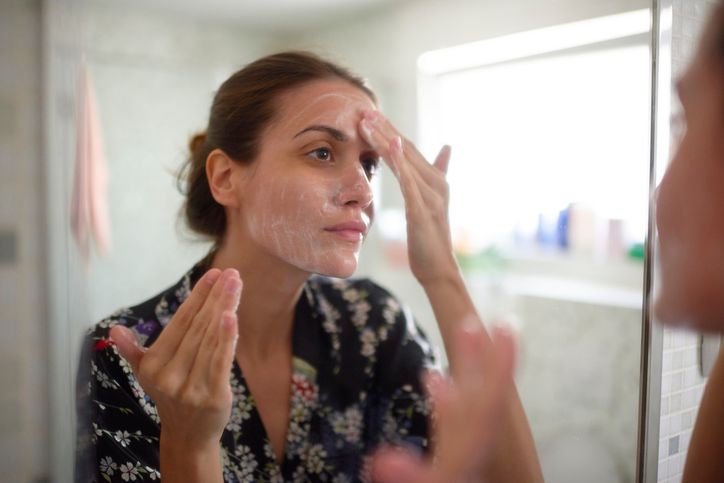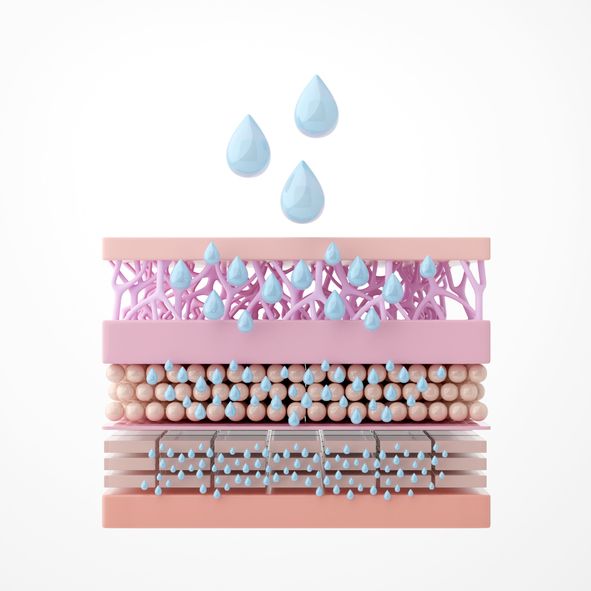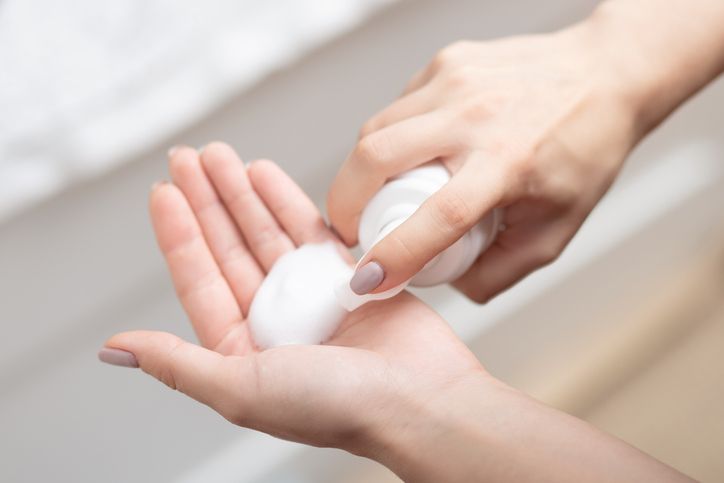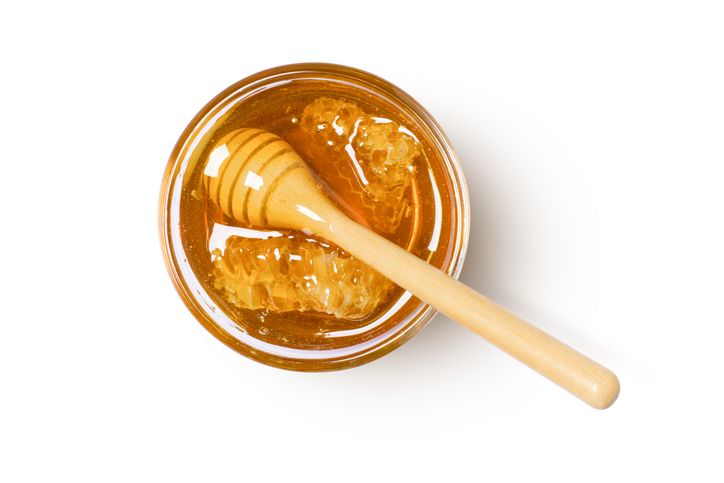Author: Natalie Ng|Updated: 1 May 2025
If your face feels tight, itchy, or starts flaking after you wash it, your face wash might be drying your skin out. A lot of cleansers out there can strip away natural oils—especially the ones with harsh ingredients or high pH levels. Hot water doesn’t help either. It can leave your skin feeling worse, not better. Using the wrong face wash for your skin type, or washing too often, can mess with your skin’s natural barrier. That’s when you start noticing things like dry patches, rough texture, or even cracked skin. If your skin is already sensitive, this can make it even harder to keep it calm and hydrated. Getting a better handle on how cleansers affect your skin is key. If you want healthy skin that stays moisturized, it’s worth knowing what to look out for—and what to avoid. Stick around. We’ve got 10 things you’ll want to know to actually treat dry skin instead of just dealing with it.

Why Your Face Wash Could Be Causing Dry Skin

1. Harsh Ingredients Strip Natural Oils
Many face washes use strong surfactants to remove dirt and oil. These ingredients don’t just clean—they also wash away the natural oils your skin needs to stay soft and protected. When that barrier is gone, it’s easier for moisture to escape, leading to dry skin, flaky skin, and even cracked skin.
2. Surfactants and Sensitive Skin
If your skin is sensitive, or if you already have skin conditions like atopic dermatitis or contact dermatitis, harsh ingredients can make things worse. You might notice itchy patches or a rough texture soon after cleansing.
3. Hot Water Makes It Worse
Washing your face with hot water feels relaxing, but it actually dries your skin out. It can damage your skin’s barrier and cause moisture to evaporate faster. This is especially a problem if your skin is already very dry or if you live in a place with low humidity or dry air.
4. Overwashing or Scrubbing Too Hard
Washing your face more than twice a day or scrubbing with rough cloths or brushes can also cause dry skin. It can leave the affected area irritated and make symptoms like redness, dryness, or itchy skin worse. Always use a soft towel and avoid rubbing.
5. pH Balance Matters
Your skin naturally sits at a slightly acidic pH. Some face washes—especially those labeled as “deep cleansing” or made with deodorant soaps—can be too alkaline. This throws off your skin’s balance, making it easier for bacteria to grow and harder to keep your skin moisturized.
What to Look for Instead
Go for fragrance free, pH-balanced cleansers that include ingredients like hyaluronic acid or moisturizing oils such as coconut oil. These help add moisture without causing irritation.

Skin Moisture and Cleansing

Your Skin’s Barrier Does More Than You Think
Your outer skin layer—called the stratum corneum—isn’t just for show. It holds natural oils, water-retaining compounds, and protective lipids that help your skin stay soft, smooth, and hydrated. This barrier keeps moisture in and blocks out bacteria, pollution, and irritants.
When you wash your face, you affect this layer. Harsh products or poor cleansing habits can break it down. Once damaged, the barrier lets water escape, and your skin starts to dry out. That’s how many people develop dry skin without even realizing it’s caused by their cleanser.
Cleansing Can Lower Your Skin’s Water Level
To stay flexible and healthy, your skin needs to hold around 30% water. A face wash that’s too harsh—or one used too often—can disrupt that balance. It removes moisture along with dirt, causing dry skin patches, tightness, and even cracked skin in more severe cases.
Why pH Balance Is a Big Deal
Healthy skin is slightly acidic—around pH 5.5. That acidity helps protect your skin and supports moisture retention. But many face washes are too alkaline, especially ones labeled as “deep cleaning” or “purifying.” These high-pH cleansers can weaken your skin’s acid mantle, making it harder to attract moisture and easier to irritate.
Using the wrong cleanser day after day can lead to severely dry skin, especially if you already have sensitive skin or skin conditions like atopic dermatitis or seborrheic dermatitis.
Next, we’ll break down which specific ingredients to watch out for—especially ones that are common but drying.
Read More
Book Now to Experience
Acne Treatment
1 Minute Self-Registration
Date should not be before minimal date

Common Ingredients That Lead to Skin Dehydration

Harsh Sulfates Strip Moisture
One of the most common reasons people develop dry skin is the use of face washes with sulfates. Ingredients like sodium lauryl sulfate (SLS) and sodium laureth sulfate (SLES) are strong cleansing agents that create foam. While they’re good at removing dirt and oil, they also strip away your skin’s natural oils.
When that protective layer disappears, your skin loses moisture faster. You might feel clean right after washing, but soon after, your skin may feel tight, rough, or flaky. Over time, this cycle can lead to extremely dry skin or even trigger skin conditions like contact dermatitis.
To avoid this, check the label for gentler surfactants like cocamidopropyl betaine or sodium cocoyl isethionate—they clean without drying your skin out.
Fragrances Disrupt Skin Balance
Artificial fragrances may make your cleanser smell nice, but they often cause more harm than good. Fragranced products can contain dozens of undisclosed chemicals that irritate the skin. If you have sensitive skin, these can trigger redness, itchy patches, or dry skin patches, even if the rest of the ingredients seem mild.
Fragrance-related irritation doesn’t always show up immediately. It can slowly damage your skin barrier and worsen symptoms over time. To stay safe, look for fragrance free cleansers, especially if your skin is already dry or reactive.
High-pH Cleansers Damage Barriers
Cleansers with high pH levels (usually 8–10) are especially harsh. They can interfere with your skin’s natural acidity, making it harder to retain moisture and easier for bacteria to cause skin infections or breakouts. High-pH products can also increase your risk for conditions like seborrheic dermatitis and cause more severe dry skin symptoms.
If your face wash leaves your skin feeling tight, almost like it’s being pulled, that’s a clear sign the pH may be too high.

Signs Your Face Wash Is Too Harsh

Your Skin Feels Tight After Washing
If your face feels tight right after cleansing, your face wash may be too drying. That tightness usually means your skin has lost too much moisture. It’s a common sign that your cleanser is stripping away natural oils. If you feel like you need to apply moisturizer immediately after washing, your skin barrier might already be compromised.
Flaky or Peeling Skin
Dry, flaky skin after washing is another clear sign your cleanser is too harsh. You might notice dry skin patches around your cheeks, nose, or forehead. In some cases, the skin may even peel. This happens when your skin doesn’t have enough moisture to stay smooth, leading to a rough texture and visible flakes.
Redness and Irritation
Redness that sticks around after cleansing isn’t normal. It can mean your face wash is irritating your skin and damaging its protective layer. This is especially common in people with sensitive skin or conditions like contact dermatitis or atopic dermatitis. If your skin feels hot, looks red, or stings after you wash your face, your cleanser could be too aggressive.
Burning or Itchy Sensation
Burning, stinging, or itchy skin after washing is a sign of damage. These symptoms show your skin barrier is irritated. You might also notice that applying moisturizer or any skincare product right after cleansing causes discomfort. This is often the result of extremely dry skin that has been exposed to harsh ingredients or hot water.
Skin Feels Rough
If your face feels bumpy or rough to the touch, your cleanser might be drying out your skin. This change in texture usually means your skin isn’t holding enough moisture. Rough skin can also increase the risk of small cracks and skin infections, especially if the affected area is already dry or irritated.
Book Now to Experience
Acne Treatment
1 Minute Self-Registration
Date should not be before minimal date

Temperature Matters: Hot vs. Cold Water Effects

Hot Water Strips Moisture
Washing your face with hot water might feel nice, but it can actually dry your skin out fast. Hot water removes natural oils from your skin’s surface, which weakens the moisture barrier. Without those oils, your skin can’t hold onto enough moisture. That’s when you start to see signs like itchy skin, dry patches, and a rough texture.
Hot water also increases water loss through evaporation. After washing, your skin might feel tight, look red, or feel sore. If you already have very dry skin or sensitive skin, hot water can make it worse, leading to cracked skin or flare-ups of skin conditions like seborrheic dermatitis or atopic dermatitis.
Cold Water Helps Your Skin Stay Balanced
Cold or lukewarm water is a better choice for your skin. It helps preserve the natural oils that keep your skin barrier strong. Cold water doesn’t dry your skin out, and it can even calm inflammation. If your skin often feels irritated or itchy after cleansing, switching to cooler water might help relieve dry skin and reduce redness.
Cool water also helps your skin hold onto the products you apply afterward. When you wash with cold water and immediately apply moisturizer, you help your skin lock in enough moisture to stay hydrated longer.

Frequency of Washing Your Face

Washing Too Often Can Dry Out Your Skin
Cleansing your face is important, but doing it too often can make your skin dry, irritated, or flaky. Every time you wash your face—especially with strong cleansers—you remove natural oils that help keep your skin moisturized. If you wash too frequently, your skin doesn’t get a chance to recover. This can lead to very dry skin, itchy patches, or even small cracks that increase the risk of skin infections.
People with dry or sensitive skin should usually stick to washing once a day, ideally at night. That’s when you remove the buildup of dirt, sweat, and pollution from the day without over-cleansing. In the morning, rinsing with water or using a moisturizing toner might be enough.
Oily Skin Might Need Twice-Daily Washing
If you have oily or acne-prone skin, you may benefit from washing twice a day—once in the morning and once at night. But even then, it's important to use a gentle, fragrance free cleanser that doesn’t cause dry skin or disrupt your skin barrier. Over-cleansing, even with oily skin, can lead to rebound oil production and more irritation.
Listen to Your Skin
If your skin feels tight, burns after washing, or develops flaky skin patches, you might be washing too often or using the wrong cleanser. Dry skin diagnosed by a dermatologist may require special care, including prescription creams or switching to a very mild, moisturizing soap.
Book Now to Experience
Acne Treatment
1 Minute Self-Registration
Date should not be before minimal date

Selecting the Right Cleanser for Your Skin Type

Why Your Skin Type Matters
Choosing the right face wash starts with knowing your skin type. The wrong cleanser can strip away too much moisture, irritate your skin, or leave behind oily buildup. Understanding your skin’s needs helps prevent very dry skin, flaky skin, or itchy patches—especially if you’re already dealing with sensitive skin or skin conditions like atopic dermatitis.
For Dry or Very Dry Skin
If your skin feels tight, looks dull, or shows dry skin patches, you likely need a cleanser that adds moisture—not takes it away. Cream or milk cleansers are best for dry skin. Look for ingredients like hyaluronic acid, glycerin, ceramides, or coconut oil. These help keep your skin moisturized and protect your barrier. Avoid sulfates, alcohol-based ingredients like isopropyl alcohol or benzyl alcohol, and always choose fragrance free options.
For Oily or Acne-Prone Skin
Oily skin needs a cleanser that can remove excess oil without over-drying. Gel or foam cleansers with salicylic acid or benzoyl peroxide can help keep pores clear. But even with oily skin, it’s important not to strip the skin completely—this can trigger more oil production and cause breakouts. Look for products that are gentle, pH-balanced, and free from harsh sulfates.
For Combination Skin
Combination skin needs balance. A mild, low-foaming cleanser that hydrates dry areas while controlling oil in the T-zone is ideal. Ingredients like niacinamide or green tea extract can help soothe dry areas while calming oily spots.
For Sensitive Skin
Sensitive skin reacts easily—often with redness, burning, or itchy skin after washing. Avoid strong fragrances, sulfates, and exfoliating agents. Choose hypoallergenic, fragrance free, and pH-balanced formulas with calming ingredients like aloe vera, chamomile, or colloidal oatmeal. Also, check labels for minimal ingredient lists to reduce the chance of irritation.

Natural Alternatives to Commercial Face Washes

Why Some People Choose Natural Cleansers
If your skin is extremely dry, sensitive, or reactive to certain ingredients, switching to natural alternatives may help. These options are less likely to include sulfates, alcohols, or synthetic fragrances that often cause irritation. Many of them work without stripping your skin’s natural oils, which can help soothe dry skin and support your barrier.
Common Natural Ingredients That Clean Without Drying
• Raw Honey
Raw honey is naturally antibacterial and helps keep your skin clean without drying it out. It also attracts moisture, which makes it useful for people with dry or very dry skin. You can apply a thin layer to damp skin, massage gently, then rinse with lukewarm water.
• Oatmeal
Colloidal oatmeal is gentle and calming. It helps relieve dry skin, reduce itchiness, and soothe irritated areas. You can grind plain oats into a powder and mix with water or yogurt to use as a mild cleanser or mask.
• Yogurt
Plain, unsweetened yogurt contains lactic acid, which gently exfoliates while keeping moisture in. It’s a good option for flaky skin and dullness. Just apply a thin layer, let it sit for a few minutes, then rinse.
• Aloe Vera
Fresh aloe vera gel cools the skin and helps calm redness or itching. It’s especially useful for people with skin conditions like seborrheic dermatitis or contact dermatitis. Aloe doesn’t strip the skin, so it’s ideal for keeping the skin barrier intact.
• Cucumber
Cucumber juice or blended cucumber can act as a light, refreshing cleanser. It hydrates and soothes irritated skin and is especially helpful in hot or dry climates where the skin loses moisture quickly.
A Few Things to Keep in Mind
Natural doesn’t always mean risk-free. Always do a patch test first, especially if you have sensitive skin or a history of allergic reactions. Also, natural cleansers don’t contain preservatives, so they should be made fresh or stored properly to avoid contamination.
Book Now to Experience
Acne Treatment
1 Minute Self-Registration
Date should not be before minimal date

Post-Cleansing Habits That Protect Skin Moisture

Apply Moisturizer While Skin Is Still Damp
Right after washing your face, your skin starts losing moisture through evaporation. To keep your skin moisturized, apply your moisturizer within 60 seconds—while your face is still slightly damp. This helps lock in moisture and support your skin barrier, especially if you're dealing with dry skin or rough texture.
Look for moisturizers with ingredients like hyaluronic acid, ceramides, mineral oils, or petroleum jelly to help soothe dry skin and prevent water loss. If you have very dry or cracked skin, layering a thicker ointment over your regular moisturizer at night can help relieve dry skin and promote healing.
Don’t Rub—Pat Gently With a Soft Towel
Rubbing your skin dry with a rough towel can make things worse. It can irritate the affected area, increase skin dryness, and cause itchy patches or even small tears in the skin. Use a soft towel, and pat your face dry gently instead. This simple habit helps protect your skin barrier and reduces the risk of triggering sensitive skin or contact dermatitis.
Layer Products Correctly
If you use serums, toners, or treatments, apply them in order from thinnest to thickest texture. This helps each product absorb properly. For example, apply hydrating serums like hyaluronic acid first, then seal everything in with a moisturizer or facial oil like coconut oil.
Night and Day Routines Matter
At night, consider using a heavier moisturizer or topical steroid (if prescribed) to treat severely dry skin or itchy patches. During the day, always use sunscreen—even if you're indoors—to protect your skin from environmental factors that can worsen dryness, like UV exposure or central heating.

When to See a Dermatologist About Dry Skin

You’ve Tried Everything, but Your Skin Is Still Dry
If you’ve changed your cleanser, adjusted your routine, and started using the right moisturizers—but your skin is still dry, tight, or irritated—it may be time to speak with a dermatologist. Persistent dry skin, even after following good skincare habits, could mean there’s something deeper going on.
Signs It’s More Than Just Dry Skin
Certain symptoms can point to a more serious problem than just moisture loss. If you notice any of the following, you should consider getting dry skin diagnosed by a professional:
• Your skin feels painful, cracks often, or develops open sores
• You’re seeing flaky skin, peeling, or redness that doesn’t improve with basic care
• You feel itching or stinging even after applying moisturizer
• Your dry skin turns into thick, scaly patches or gets worse during certain seasons
• You notice signs of skin infections like swelling, crusting, or yellowish discharge
• You have skin conditions like eczema, atopic dermatitis, or seborrheic dermatitis that flare up frequently
How a Dermatologist Can Help
A dermatologist will look at your symptoms, ask about your bathing habits, product use, and medical history, and may test for allergies or health conditions that affect your skin. They can also check for risk factors like low humidity, certain diseases, or even reactions to laundry detergent or skincare ingredients.
They may recommend treatments like topical steroid creams, prescription moisturizers, or lifestyle changes. Getting the right diagnosis can help prevent your dry skin from getting worse—and make it easier to relieve dry skin long-term.
Book Now to Experience
Acne Treatment
1 Minute Self-Registration
Date should not be before minimal date

Final Tips to Keep Your Skin Hydrated After Cleansing

Use More Than One Moisturizer If Needed
If you have severely dry skin, a single product might not be enough. It can help to layer moisturizers. Start with a lightweight lotion that attracts moisture, like one with hyaluronic acid, and follow with a thicker cream or petroleum jelly to seal it in. This method helps reduce cracked skin, especially on affected areas that feel rough or irritated.
Keep the Air Moist
Dry air—whether from central heating, cold weather, or low humidity—can pull water from your skin. Use a humidifier indoors, especially while you sleep, to keep the air moist. This small change can make a big difference in preventing extremely dry skin, especially in cooler months.
Avoid Common Triggers
Watch out for laundry detergent, deodorant soaps, and other harsh household products that touch your face. These can all worsen dryness, especially if your skin is already irritated. Wearing gloves while cleaning, avoiding long hot showers or hot baths, and sticking to moisturizing soap can all help reduce flare-ups.
Apply Moisturizer Immediately
Always apply moisturizer immediately after washing your face. This locks in the moisture before it evaporates. Skipping this step or waiting too long can cause your skin to dry out, especially if you're already prone to rough texture or itchy patches.

How New Beauty’s Acne Treatment Can Help With Dry Skin and Breakouts
If you’re dealing with dry skin and acne at the same time, finding the right solution can feel impossible. Many acne products dry out the skin even more, leading to itchy patches, flaky skin, or a rough, tight feeling. That’s where the Acne Treatment comes in—this non-invasive, skin-friendly treatment not only helps reduce breakouts, but it also supports your skin’s moisture levels.
How the Acne Treatment Works
This treatment starts with dual spiral suction and drainage. It clears away dead skin cells, dirt, and oil while gently exfoliating and unclogging pores. Unlike harsh scrubs or drying medications, it doesn’t strip your skin of natural oils. Instead, it calms inflammation and makes space for healing.
Once the skin is cleared, a hydrating serum is infused into the skin. This medical-grade essence helps soothe dry skin, restore your moisture barrier, and balance oil production. This makes future breakouts less likely while improving skin tone and overall texture. It also supports collagen production, which can reduce the look of acne scars and smooth out rough texture.
Why It’s a Good Option for Dry, Acne-Prone Skin
• Helps treat dry skin without causing irritation
• Calms the sebaceous glands, preventing excess oil and clogged pores
• Reduces inflammation while improving hydration
• Non-invasive—no injections, medication, or harsh peeling
• Suitable for most skin types, including sensitive skin and those with acne scarring or whiteheads
Whether you're dealing with very dry skin, stubborn blackheads, or frequent breakouts, this treatment gives your skin a chance to reset without over-drying or damaging your skin barrier.
Book the Acne Treatment Today and start restoring clear, balanced, and healthy skin—without making your dry skin worse.
New Beauty's Acne TreatmentBook Now to Experience
Acne Treatment
1 Minute Self-Registration
Date should not be before minimal date
FAQ
Can Face Wash Cause Permanent Damage to Skin Barrier Function?
Face wash can cause long-term damage to your skin barrier if you're using harsh products or over-cleansing. While permanent damage is rare, aggressive cleansers with high pH levels and strong surfactants can weaken your skin's protective barrier over time. You'll notice increased sensitivity, redness, and persistent dryness. To protect your barrier function, choose gentle, pH-balanced cleansers and don't wash more than twice daily.
Does Wearing Makeup Affect How Face Wash Dries Out Skin?
Studies show that 85% of people who wear makeup daily experience increased skin dryness when using harsh face washes. Yes, wearing makeup can intensify how face wash dries out your skin. Your makeup creates a barrier that often requires stronger cleansers or double cleansing to remove completely. These stronger products strip more natural oils from your skin, leading to increased dryness and potential irritation.
Can Seasonal Changes Impact How Face Wash Affects Skin Dryness?
Yes, seasonal changes substantially impact how face wash affects your skin's moisture levels. During winter, cold air and indoor heating can make your skin more susceptible to dryness, so your regular face wash might suddenly feel harsh. In summer, humidity levels fluctuate, and you might need to adjust your cleansing routine. You'll notice your skin's needs change throughout the year, requiring different face wash formulations.
Should Face Wash Be Stored at Specific Temperatures to Maintain Effectiveness?
Did you know that facial cleansers can lose up to 40% of their active ingredients when exposed to extreme temperatures? You'll want to store your face wash at room temperature, ideally between 60-77°F (15-25°C). Keep it away from direct sunlight and out of your steamy bathroom. Don't refrigerate your cleanser unless specifically directed by the manufacturer, as cold temperatures can alter its texture and effectiveness.
Can Using Expired Face Wash Increase Skin Dryness and Irritation?
Yes, using expired face wash can definitely increase skin dryness and irritation. When face wash products expire, their ingredients can break down and become unstable, leading to changes in pH levels and chemical composition. You'll likely experience increased dryness, redness, and potential skin reactions. The preservatives might also become ineffective, allowing harmful bacteria to grow, which could further irritate your skin and disrupt its natural moisture balance.
Recommended Articles
COPYRIGHT© NEW BEAUTY MANAGEMENT LIMITED 2026. ALL RIGHT RESERVED.




